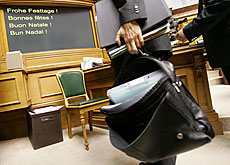Corruption hotline rings company alarm bells

An anonymous hotline for white-collar "whistleblowers" is being set up by Transparency International Switzerland, an anti-corruption organisation.
The move comes a week after the Swiss Senate demanded better protection for whistleblowers against unfair dismissal and other forms of discrimination.
The hotline will take its first calls on Wednesday and will advise whistleblowers on what action to take.
“Our staff will advise the whistleblower on his or her rights and options and which authority to inform,” Anne Schwöbel, head of the non-profit organisation, told swissinfo.
A whistleblower is an employee, former employee, or member of an organisation who reports misconduct to his or her employer or to people or institutions that have the power to take corrective action.
“We examine the case and we will transfer it to the Institute of Law at Zurich University. If we think it could be a case of corruption, we try to convince the whistleblower to go first to his or her employer and second – if the employer does not react or is involved in the case – to the police.”
The success of the hotline in the fight against corruption will also be monitored by the Institute.
Risky business
Transparency International Switzerland says the first step for any potential whistleblower is to draw to their employer’s attention to any possible corruption. This is called internal whistleblowing.
If the employer does not react, or implies that the whistleblower is involved or threatens them in another way, then the employee should go to the authorities – external whistleblowing.
This is not without danger as many – now former – employees have discovered. Switzerland is still catching up when it comes to protecting whistleblowers, according to Schwöbel.
“It’s a really risky business and in particular the Anglo-Saxon countries like the United States, Britain and Australia already have whistleblower protection,” she admitted.
“Switzerland now finally wants to change the law. So we’re seeing some positive steps in the right direction.”
Changes
Last year the French Data Protection Authority banned anonymous whistleblower hotlines, saying the risk of “slanderous denunciations” outweighed the intended benefits.
A German court has also ruled that employee codes of conduct encouraging whistleblowing hotlines breach German labour law.
However, last week the Swiss Senate demanded proposals from the Swiss government on how to protect whistleblowers in private companies and the public sector from unfair dismissal.
They said sanctions, and if necessary an increase in compensation – which currently stands at six months – would deter employers from firing people without just cause.
Not the police
Another potential danger is that disgruntled employees will simply call the hotline to get revenge on their bosses – what the French Data Protection Authority called “slanderous denunciations”.
“There is a risk, but [callers] always have to substantiate their case,” Schwöbel explained.
“We’re not examining magistrates, we’re not the police – we’re just the first step. If the whistleblower did the internal steps but is afraid to bring the case to the police, Transparency will forward the case anonymously to the competent authority.
“But it is the police or the competent authorities who have to decide whether to open a case or not.”
swissinfo, Thomas Stephens
A third of Swiss workers will come across illicit dealings during their career and around 12 per cent of economic crime concerning Swiss companies involves corruption.
One study by financial analysts KPMG into economic crimes in Swiss companies put corruption in second place, behind fraud.
Experts estimate that only 1-3 per cent of all instances of corruption get reported.
Global corruption adds up to an estimated $400 billion (SFr520 billion) a year.
Transparency International is the leading non-governmental organisation devoted to combating corruption.
It has launched a hotline (031 382 5044) which will be staffed every Wednesday from 10am-5pm.
With an international secretariat in Berlin and more than 85 national chapters, it works to curb the supply and demand of corrupt practices.

In compliance with the JTI standards
More: SWI swissinfo.ch certified by the Journalism Trust Initiative



You can find an overview of ongoing debates with our journalists here. Please join us!
If you want to start a conversation about a topic raised in this article or want to report factual errors, email us at english@swissinfo.ch.